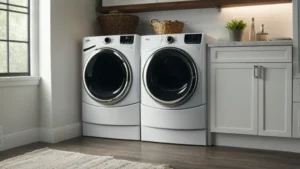Major appliances play a crucial role in our daily lives. From refrigerators and washing machines to ovens and dishwashers, these appliances make our lives easier and more convenient. However, over time, these appliances can become outdated, inefficient, and prone to breakdowns. That’s why it’s important to consider replacing or upgrading them. Not only can this improve efficiency and save money, but it can also enhance the overall look of your home.
Key Takeaways
- Replacing and upgrading major appliances is important for the safety, efficiency, and functionality of your home.
- Signs that your major appliance needs replacing or upgrading include frequent breakdowns, high energy bills, and outdated technology.
- Factors to consider when replacing or upgrading major appliances include budget, energy efficiency, size, and style.
- Upgrading to energy-efficient appliances can save you money on energy bills and reduce your carbon footprint.
- Choosing the right size and style of major appliance for your home depends on your needs and preferences. Proper maintenance and safe disposal of old appliances can extend their lifespan and protect the environment.
Signs That Your Major Appliance Needs Replacing or Upgrading
There are several signs that indicate it may be time to replace or upgrade your major appliance. One of the most obvious signs is frequent breakdowns and repairs. If you find yourself constantly calling a repair technician to fix your appliance, it may be more cost-effective to invest in a new one.
Another sign is high energy bills. Older appliances tend to be less energy-efficient, which can result in higher utility costs. By upgrading to a newer, more energy-efficient model, you can save money on your monthly bills.
Outdated technology and features are also a clear indication that it’s time for an upgrade. Newer appliances often come with advanced features and technologies that can make your life easier and more convenient. From smart home integration to energy-saving modes, these features can greatly enhance your appliance’s performance.
Lastly, visible wear and tear on your appliance is a sign that it may be time for a replacement. If your appliance is showing signs of rust, cracks, or other physical damage, it may not be functioning at its best. Upgrading to a new appliance can not only improve its performance but also enhance the overall aesthetics of your home.
Factors to Consider When Replacing or Upgrading Major Appliances
When it comes to replacing or upgrading major appliances, there are several factors to consider. First and foremost is your budget. Determine how much you are willing to spend on a new appliance and stick to that budget. Keep in mind that while higher-end appliances may come with more features and better performance, they also tend to be more expensive.
Size and style are also important considerations. Measure the space available in your home to ensure that the new appliance will fit properly. Additionally, consider the style of the appliance and how it will complement your home’s decor. Whether you prefer a sleek stainless steel finish or a more traditional look, choose an appliance that matches your personal style.
Energy efficiency is another crucial factor to consider. Look for appliances with an Energy Star rating, as these are designed to be more energy-efficient and can help you save money on your utility bills. Additionally, energy-efficient appliances have a lower carbon footprint, making them better for the environment.
Lastly, consider the brand and model reputation. Research different brands and read reviews from other customers to ensure that you are investing in a reliable and durable appliance. Look for brands that have a good reputation for quality and customer service.
The Benefits of Upgrading to Energy-Efficient Appliances
Upgrading to energy-efficient appliances offers several benefits. One of the most significant advantages is lower energy bills. Energy-efficient appliances are designed to use less electricity or gas, resulting in reduced energy consumption and lower monthly bills. Over time, these savings can add up significantly.
In addition to saving money, energy-efficient appliances also have a reduced carbon footprint. By using less energy, they help to conserve natural resources and reduce greenhouse gas emissions. This is not only beneficial for the environment but also for future generations.
Furthermore, energy-efficient appliances often come with improved performance and durability. They are designed to operate more efficiently, resulting in better overall performance. Additionally, these appliances are often built with high-quality materials and components, making them more durable and long-lasting.
How to Choose the Right Size and Style of Major Appliance for Your Home
Choosing the right size and style of major appliance for your home is essential to ensure a proper fit and a cohesive look. Start by measuring the space available for the appliance. Take into account any height, width, or depth restrictions to ensure that the new appliance will fit properly.
Next, consider your household’s needs and lifestyle. If you have a large family, you may need a larger refrigerator or dishwasher to accommodate your needs. On the other hand, if you live alone or have limited space, a smaller appliance may be more suitable.
When it comes to style, choose an appliance that complements your home’s decor. Consider the existing color scheme and design elements in your kitchen or laundry room. Whether you prefer a modern, sleek look or a more traditional aesthetic, there are plenty of options available to suit your personal style.
Tips for Properly Maintaining Your Major Appliances to Extend Their Lifespan

Proper maintenance is key to extending the lifespan of your major appliances. Regular cleaning and maintenance can help prevent breakdowns and keep your appliances running smoothly. Follow the manufacturer’s instructions for cleaning and maintenance, as each appliance may have specific requirements.
Address any issues promptly to prevent further damage. If you notice any strange noises, leaks, or other signs of malfunction, contact a professional technician to assess and repair the problem. Ignoring these issues can lead to more extensive damage and costly repairs down the line.
Additionally, it’s important to use your appliances properly and avoid overloading them. Overloading can put unnecessary strain on the appliance’s components and reduce its lifespan. Follow the recommended load capacities and operating instructions for each appliance.
How to Safely Remove and Dispose of Your Old Major Appliances
When it’s time to replace your old major appliances, it’s important to dispose of them safely and responsibly. Check local regulations regarding appliance disposal and recycling options. Some areas may have specific guidelines or designated drop-off locations for appliances.
If you are unsure about how to safely remove and dispose of your old appliance, consider hiring a professional. They will have the necessary equipment and expertise to safely remove the appliance from your home and dispose of it properly.
Alternatively, you may also consider donating your old appliance if it is still in working condition. Many charitable organizations accept used appliances and will refurbish them for those in need. This is a great way to give back to your community and reduce waste.
The Cost of Replacing and Upgrading Major Appliances: Is it Worth it?
The cost of replacing and upgrading major appliances can vary depending on the brand, model, and features. While it may seem like a significant investment upfront, it’s important to consider the long-term savings and benefits.
Energy-efficient appliances can help you save money on your monthly utility bills, which can offset the initial cost over time. Additionally, these appliances often come with improved performance and durability, reducing the need for costly repairs or replacements in the future.
When considering the cost, compare prices and features from different brands and retailers. Look for sales, discounts, or promotions that can help you save money. Additionally, consider the reputation of the brand and model to ensure that you are investing in a reliable appliance that will last.
How to Hire a Professional to Install Your New Major Appliance
If you are not comfortable installing your new major appliance yourself, it’s important to hire a professional to ensure proper installation. Here are some tips for hiring a professional:
1. Research and compare professionals: Look for reputable professionals in your area who specialize in appliance installation. Read reviews from other customers to get an idea of their quality of work.
2. Check for licenses and insurance: Ensure that the professional you hire is licensed and insured. This will protect you in case of any accidents or damages during the installation process.
3. Get a written estimate and contract: Before hiring a professional, get a written estimate that outlines the cost of the installation. Additionally, make sure to have a contract that clearly states the scope of work and any warranties or guarantees.
Enjoying the Benefits of Your New and Improved Major Appliances
Replacing or upgrading major appliances can greatly improve your quality of life. From lower energy bills to improved performance, these appliances offer numerous benefits. By properly maintaining and caring for your appliances, you can extend their lifespan and save money in the long run. So, if you’re experiencing frequent breakdowns or high energy bills, it may be time to consider replacing or upgrading your major appliances.
If you’re in the market for replacing and upgrading major appliances, you’ll definitely want to check out this informative article on 911 Appliance’s blog. The article titled “The Ultimate Guide to Choosing the Right Appliances for Your Home” provides valuable insights and tips on selecting the perfect appliances that suit your needs and preferences. From energy efficiency to functionality, this article covers it all. Don’t miss out on this helpful resource! Read more
What Are the Best Upgrades for Modern Major Appliances in Homes and Kitchens?
When it comes to upgrading modern major appliances in homes and kitchens, keeping up with the latest trends in modern appliances is crucial. From smart technology features and energy-efficient designs to sleek finishes and advanced cooking capabilities, these upgrades can enhance the functionality and aesthetic appeal of any living space.
Table of Contents
- Key Takeaways
- Signs That Your Major Appliance Needs Replacing or Upgrading
- Factors to Consider When Replacing or Upgrading Major Appliances
- The Benefits of Upgrading to Energy-Efficient Appliances
- How to Choose the Right Size and Style of Major Appliance for Your Home
- Tips for Properly Maintaining Your Major Appliances to Extend Their Lifespan
- How to Safely Remove and Dispose of Your Old Major Appliances
- The Cost of Replacing and Upgrading Major Appliances: Is it Worth it?
- How to Hire a Professional to Install Your New Major Appliance
- Enjoying the Benefits of Your New and Improved Major Appliances
- What Are the Best Upgrades for Modern Major Appliances in Homes and Kitchens?
- FAQs
- What are major appliances?
- When should I replace my major appliances?
- What should I consider when replacing my major appliances?
- What are the benefits of upgrading my major appliances?
- What should I do with my old appliances?



